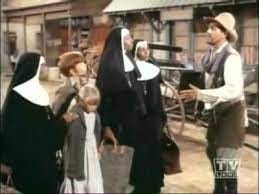So grateful for Gunsmoke reruns on Cable TV and the random luck associated with “the clicker.” It’s how I learned of the talented William Kelley (1929 -2003) and discovered his writing.
The episode was “The Sisters.” It first aired in 1969, the fourteenth episode of the fifteenth season of the series. Three nuns arrive in Dodge City looking for the long-gone father of the children they have in tow, their mother having recently died. They do find the curmudgeon, an ornery mountain-man, thanks to Festus. For once, Matt Dillon is not the hero.
Currently it’s available on Paramount Plus - or if you come across it on broadcast TV it’s worth a look even if you have to endure a few Medicare (or walk-in bathtub) commercials. Stick around for the credits and you will see the story was written by William Kelley.
Who was William Kelley?
Between 1964 and 1984, in addition to Gunsmoke, he wrote dozens of stories for Route 66, Death Valley Days, Dukes of Hazzard, Bonanza, Columbo, Kung Fu, How the West was Won, T. J. Hooker, and other TV shows.
And then, his big cinema break: He co-wrote with Earl W. Wallace, the screenplay for the 1985 hit movie Witness starring Harrison Ford. Kelley and Wallace won an “Oscar” for Best Original Screenplay.
If you have seen Witness, you’ll remember its many riveting scenes – but riveting scenes require riveting dialogue and riveting characters.
That is Kelley’s winning trifecta: characters, dialogue, scenes; he was a master of them all.
Kelley studied for the priesthood for three years in the early ‘50s at Villanova University which helps explain a powerful pastoral thread he weaves into the fabric of his work: virtue among vice, human dignity even in weakness and sin, always the chance for redemption.
His five novels are:
Gemini (1959)
The God Hunters (1964)
The Sweet Summer (2000)
The Tyree Legend (2000)
A Servant of Slaves (2003)
I’ve only read The God Hunters which I thoroughly enjoyed - the San Francisco Chronicle called it “a big surging Irving Wallace kind of novel about a fabulous Catholic family.” It ranks among the best five books I read in 2023.
You’ll likely have to go to used-book websites to find his other novels; it’s where I found The Sweet Summer about which novelist Leon Uris wrote: “An elegant, simple story of compassion and redemption among men, and I am grateful to Kelley for it.”
William Kelley died in Los Angeles in 2003 at the age of seventy-four. Earl W. Wallace was quoted in Kelley’s obituary in the Los Angeles Times: “I think his strength as a writer was that sense of humor, a particular affection for bigger-than-life characters and marvelous dialogue that could have you rolling on the floor one moment and wiping a tear from your eye the next moment.”




